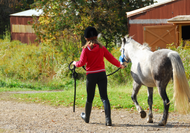Overheating in horses is caused by the horse’s inability to cool itself adequately through sweating or cooling down through shade and water.
When travelling with your horse, you should be aware of how heat can affect your horse. Horses are hardy animals and are able to survive in hot weather, but overheating is one of the most common reasons for colic. In addition to colic, overheating can also cause other health problems.
If you notice that your horse is sweating excessively after being out in the sun, it’s time to give him some water and find some shade before he gets too stressed. The amount of water and shade needed depends on how hot it is outside – which means that if you travel with a group of horses they will all need different amounts depending on their size and breed!
You can avoid overheating by not exercising hard in the heat of the day when humidity is high.
When it's hot and humid, don't exercise your horse in direct sun. Instead, exercise them early in the morning or late at night when the temperature is lower and humidity has decreased. It's also important to make sure you have ample shade available for your horse during any ride or workout.
If you must exercise your horse during a hot day, try to do so early in the morning before it gets too warm outside. Also, be sure to stop frequently so they can rest and cool off with water—no one can work hard if they're overheating!
Cool your horse down before loading him into a trailer.
Before you load your horse into a trailer, make sure that he is thoroughly cooled down.
To cool your horse down:
- Provide water. Give him access to fresh, clean water. He can take sips or gulps as he needs them.
- Provide shade. If there is no shade available at the loading site, consider bringing along an umbrella or gazebo that you can cover your horse with (make sure it's large enough so that it covers his head as well).
- Consider using fans if possible—these are especially helpful when combined with cold packs (see below)!
Monitor your horse for signs of heat stress on a trip.
It's important to monitor your horse for signs of heat stress on a trip. Signs of heat stress include excessive sweating, heavy breathing, and a rapid heart rate. If you notice these signs, stop and give your horse a break. If you are worried call a veterinarian right away!
Don't let your horse stand at rest stops with no access to water and/or shade if it's hot outside.
Don't let your horse stand at rest stops with no access to water and/or shade if it's hot outside. Horses can get very hot, especially when they are working hard while being ridden or whilst travelling. Make sure there is a shady area where your horse can rest and drink cool water if he needs it during long drives such as those encountered on long trips. When planning your route try and avoid potential traffic congestion and slow moving stretches through towns and cities where possible.
Travel as early in the morning or as late at night as possible during summer months.
The best time to travel is early in the morning, or at night. When travelling at these times you will be cooler than if you were going during the day.
Keeping your horse cool and hydrated is the best way to make sure he has a safe trip this summer!
While traveling, it’s important to focus on keeping your horse cool and hydrated. In the summer months, heat stroke is a serious concern for road-tripping horses. Heat stroke occurs when body temperature rises above 104 degrees Fahrenheit (40 degrees Celsius). When this happens, the brain sends signals to the body for it to stop exercising; however, if these signals are not received quickly enough or at all due to extreme heat stress or dehydration, then death can occur.
To prevent heat stress while travelling with your horse this summer:
- Use a water bucket filled with cool water instead of using a standard water bucket that has been sitting out in the sun all day long
- Use fans if possible in the trailer - they will keep air moving so that any stagnant areas do not get too hot and increase humidity levels significantly which reduces the horses ability to cool himself.



